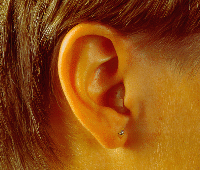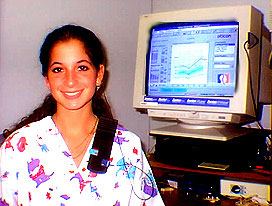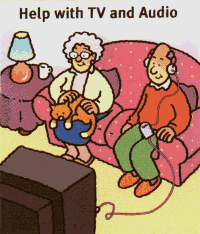Hearing Aids &
Assistive Devices
![]()
Hearing Aids and Assistive Devices : Hearing Aids are increasingly common and increasingly small. They should be designed to suit the hearing loss of the person as hearing losses and ears come in an infinite variety!. Most properly fitted hearing aids will still need adjustment and practice before they are most effective.


Aid types most often seen: In-the-Ear aids are
most common but can be difficult to control and adjust for very
elderly people or those with weak hands. The tiny hearing aid that you can see here could be a programmable
instrument - with a number of digital chips on which information
can be stored - which can be connected to a computer-based
programming device in order to 'fine-tune' the hearing aid for
the individual. These can adapt the loudness
of the hearing aid according to the incoming sound level in the
most comfortable way for the person wearing the hearing aid, and even filter out some of the background noise.
These type of 'digital' or 'digitally programmable'
hearing aids are more common and with a better price range. Other technologies such as 'MULTI-MICROPHONE' technologies are also helping to improve the ability of hearing impaired people to hear what they want to hear!

Behind-the-Ear aids can be digital, programmable or
non-programmable; they have a separate earpiece called earmould which can be replaced easily - VERY practical for children with growing ears but whose hearing loss stays the same! So don't be fooled into thinking that larger means old-fashioned; for many with more severe loss, the Behind-the-Ear aid offers more possibilities and clearer sound.Cochlear Implants give sound to people who had none before, even with other powerful hearing aids. However, they are not miracle
cures and involve considerable assessment and counselling both
before and after surgery for full benefit. Hearing aids should
always be tried first. Beaumont Hospital are the only centre in the Republic of Ireland - there is another centre in Belfast.
Children in Ireland are all entitled to free hearing aids through Health Boards if needed, as are adults with Medical Cards. Others must buy their hearing aids; P.R.S.I. payers can get partial refunds if they are fitted by a Hearing Aid Audiologist who is registered with the Department of Social Welfare. Make sure to ask before you buy.
Other assistive devices, such as telephone amplifiers, room or
personal induction loops (with T setting on the aid), extension
or flashing doorbells, usually have to be bought but tend to cost
less than hearing aids.  Some devices, such as the
Minicom system which is a Text Telephone for very deaf people,
may be grant-aided; also, if the device is required at your
workplace to assist you with your job, then you may be entitled
to a grant for this - ask N.A.D.
Some devices, such as the
Minicom system which is a Text Telephone for very deaf people,
may be grant-aided; also, if the device is required at your
workplace to assist you with your job, then you may be entitled
to a grant for this - ask N.A.D.